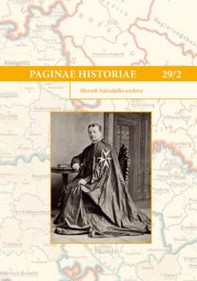VYTVOŘENÍ DOLLFUSSOVY VLÁDY Z POHLEDU KŘESŤANSKÝCH SOCIALISTŮ
FORMATION OF DOLLFUSS’ GOVERNMENT FROM THE POINT OF VIEW OF THE CHRISTIAN SOCIALISTS
Author(s): Miroslav ŠeptákSubject(s): Christian Theology and Religion, Political history, Government/Political systems, Politics and religion, Interwar Period (1920 - 1939)
Published by: Národní archiv
Keywords: Dollfuss’ Government; Christian Socialists; Engelbert Dollfuss;
Summary/Abstract: Formation of the government by Christian socialist Engelbert Dollfuss has been rightly designated within historiography as one of the milestones in modern Austrian history. The present research, excluding a few exceptions, almost forgot the preserved stenographic texts from the Christian Socialist Parliamentary Club that in fact played the role of party presidium. The results of regional votes on 24 April 1932, and first of all the unexpected success of non-parliamentary party of Austrian Nazis, caused an internal crisis resulting in governmental resignation. Federal Chancellor Karl Buresch aimed at an emergence of a coalition of all non-socialist parties but he met with strong opposition among pan-Germans who could not forget disagreements some time before. Engelbert Dollfuss was authorized by Christian Social Party to lead the talks after unsuccessful attempts to unify right-wing and middle-right parties on the governmental platform. The successful Minister of Agriculture was acceptable for all potential partners in contrast with Buresch. The course of negotiations was complicated by sometimes unpredictable attempts for maximal use of the present coalition and pressure potential of individual parties. Dollfuss’ effort to form a government of all non-socialist political parties was unsuccessful due to the attitude of pan-Germans. The National Liberals preferred their perseverance in opposition to participation in the coalition in the hope that they could prevent the outflow of voters to the Nazi camp. Their unwillingness to take governmental responsibility reduced coalition options to collaboration of the Christian socialists, the Landbund and the Heimatblock. The Federal President Wilhelm Miklas named a new Austrian government on 20 May 1932 led by Engelbert Dollfuss. Some events from forming the new Cabinet were kept in secret from the public. Both parties, i. e. the Christian socialists and the Social democracy had not taken a large coalition into consideration. In that sense there were only noncom-mittal and diffident probes which soon were to no effect from the reason of mutual unwillingness to find consensus and listen to the opposition.
Journal: Paginae Historiae
- Issue Year: 29/2021
- Issue No: 2
- Page Range: 103-120
- Page Count: 18
- Language: Czech

